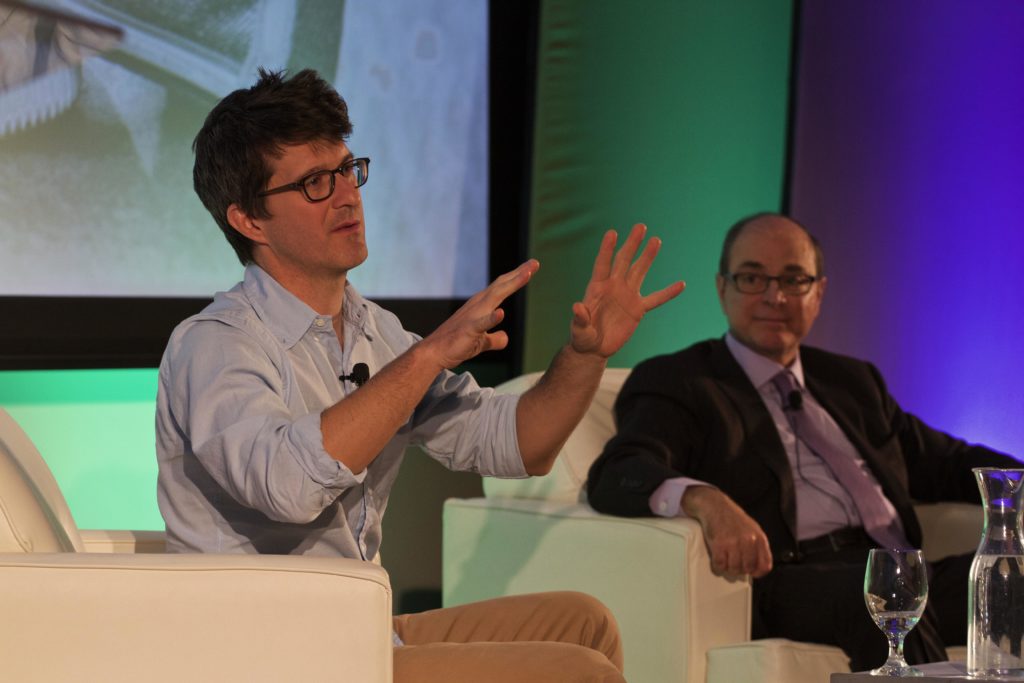By Jose Castillo, A&E columnist
Audience members packed into the penthouse atop the 17th floor of East Village, awaiting a presentation that would answer their questions about data analytics, algorithms and why no one is swiping right on their dating profiles.
The Future of Dating, hosted on Feb. 11 by President Joseph E. Aoun, was a presentation from Christian Rudder, author and founder of the dating site OkCupid.
The event started with a short film featuring Northeastern students discussing the advantages and disadvantages of dating in the 21st century. After, Rudder began his presentation by discussing OkCupid’s initial issues with the matching process. At its launch in 2004, the site operated on a “question and answer” basis, matching users solely on responses, Rudder said.
“If you want to have kids, then you want to be with someone who would also want to have kids,” Rudder said, referring to the advantages and intricacy of survey-based matching. “But if you are sexually dominant or something, you don’t want another dominant person. You’d need an asymmetrical relationship, unless there’s a lot of butting of heads, so to speak.”
Rudder pointed out the issue with such a matching system, explaining it typically leads to users picking out the most attractive profiles available to them instead of making decisions based on survey compatibilities, profile descriptions or listed interests.
“It turns out, just like many things conceived purely in theory, in practice, it is not enough,” Rudder said. “You put all this energy into building a launch. People come, they spend a lot of time working on their profile, they upload their best pictures, and [then] other people come and swipe right or click on the hottest person, ignoring everything else.”
Rudder referred to this as the “focus problem,” which essentially leads to one attractive profile receiving numerous messages, becoming overwhelmed and then leaving the site. The people who messaged the attractive person but did not receive a response then either messaged the second-most attractive person or left as well.
Rudder cited this problem as the death spiral many dating site startups face.
In order to combat the problem, Rudder and his team of mathematicians at OkCupid decided to match users based on four different categories: attractiveness, responsiveness, randomness and “matchiness,” a term Rudder coined.
“Matchiness,” in Rudder’s words, is giving users what they want and is also taken care of through surveys. Rudder explained how profiles that were more responsive were given more matches than profiles that were not.
Finally, Rudder emphasized that ultimately, there is no simple calculation that can lead to the perfect match, and therefore, randomness has to always be taken into account.
“If anyone ever complains to you, ‘all the people I’m seeing on Tinder are ugly,’ that means that everyone there thinks that person is ugly, and you can smile to yourself about that,” Rudder said.
After the presentation, President Aoun asked Rudder questions proposed by audience members, Facebook and Twitter users. Questions ranged from the complications of global dating to better societal outcomes of using dating sites and the ethics of analyzing big data.
“I attended this event because I’ve been on my fair share of online dating websites,” sophomore computer science major Leandro Taveras said. “I’m really interested in big data and the analytics that go into big endeavors like this.”
Even those unfamiliar with online dating were still intrigued by the presentation.
“I’m old-fashioned. I think you can find someone in a serendipity aspect, and go on a date with them, at a bar, a party, something like that,” sophomore behavioral neuroscience major Mary Legget said. “But because dating apps have become so new and upcoming, I decided to come and learn more about them.”
The next installment of the Presidential Speaker Series will be held on Feb. 25, when Aoun will host a conversation with Chris Kimball, co-founder of America’s Test Kitchen.
Photo by Alex Melangrano









